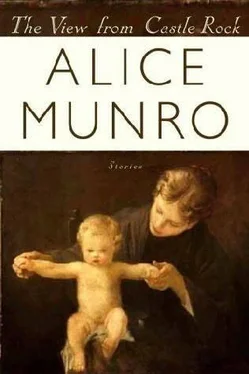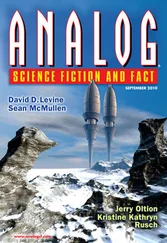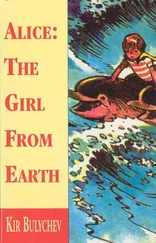He was moving things around on the tool shelf. Soon he either found what he wanted or put back what he had intended to put back, and he switched off the light and left. He never knew that I was there.
I pulled up my bathing suit and got out of the water and went up the stairs. My body seemed such a weight to me that I was out of breath when I got to the top.
The sound of the cocktail party went on and on. I had to do something to hold my own against it, so I started to write a letter to Dawna, who was my best friend at that time. I described the cocktail party in lurid terms-people vomited over the deck railing and a woman passed out, falling down on the sofa in such a way that part of her dress slid off and exposed a purple-nippled old breast (I called it a bezoom). I spoke of Mr. Hammond as a letch, though I added that he was very good-looking. I said that he had fondled me in the kitchen while my hands were busy with the meatballs and that later he had followed me to the boathouse and grabbed me on the stairs. But I had kicked him where he wouldn’t forget and he had retreated. Scurried away, I said.
“So hold your breath for the next installment,” I wrote. “Entitled, ’Sordid Adventures of a Kitchen Maid.’ Or ’Ravaged on the Rocks of Georgian Bay.’“
When I saw that I had written “ravaged” instead of “ravished,” I thought I could let it go, because Dawna would never know the difference. But I realized that the part about Mr. Hammond was overdone, even for that sort of letter, and then the whole thing filled me with shame and a sense of my own failure and loneliness. I crumpled it up. There had not been any point in writing this letter except to assure myself that I had some contact with the world and that exciting things-sexual things-happened to me. And I hadn’t. They didn’t.
“Mrs. Foley asked me where Jane was,” I had said, when Mrs. Montjoy and I were doing the silver-or when she was keeping an eye on me doing the silver. “Was Jane one of the other girls who worked here in the summer?”
I thought for a moment that she might not answer, but she did.
“Jane was my other daughter,” she said. “She was Mary Anne’s sister. She died.”
I said, “Oh. I didn’t know.” I said, “Oh. I’m sorry.
“Did she die of polio?” I said, because I did not have the sense, or you might say the decency, not to go on. And in those days children still died of polio, every summer.
“No,” said Mrs. Montjoy. “She was killed when my husband moved the dresser in our bedroom. He was looking for something he thought he might have dropped behind it. He didn’t realize she was in the way. One of the casters caught on the rug and the whole thing toppled over on her.”
I knew every bit of this, of course. Mary Anne had already told me. She had told me even before Mrs. Foley asked me where Jane was and clawed at my breast.
“How awful,” I said.
“Well. It was just one of those things.”
My deception made me feel queasy. I dropped a fork on the floor.
Mrs. Montjoy picked it up.
“Remember to wash this again.”
How strange that I did not question my right to pry, to barge in and bring this to the surface. Part of the reason must have been that in the society I came from, things like that were never buried for good, but ritualistically resurrected, and that such horrors were like a badge people wore-or, mostly, that women wore-throughout their lives.
Also it may have been because I would never quite give up when it came to demanding intimacy, or at least some kind of equality, even with a person I did not like.
Cruelty was a thing I could not recognize in myself. I thought I was blameless here, and in any dealings with this family. All because of being young, and poor, and knowing about Nausicaa.
I did not have the grace or fortitude to be a servant.
On my last Sunday I was alone in the boathouse, packing up my things in the suitcase I had brought-the same suitcase that had gone with my mother and father on their wedding trip and the only one we had in the house. When I pulled it out from under my cot and opened it up, it smelled of home-of the closet at the end of the upstairs hall where it usually sat, close to the mothballed winter coats and the rubber sheet once used on children’s beds. But when you got it out at home it always smelled faintly of trains and coal fires and cities-of travel.
I heard steps on the path, a stumbling step into the boat-house, a rapping on the wall. It was Mr. Montjoy.
“Are you up there? Are you up there?”
His voice was boisterous, jovial, as I had heard it before when he had been drinking. As of course he had been drinking-for once again there were people visiting, celebrating the end of summer. I came to the top of the stairs. He had a hand against the wall to steady himself-a boat had gone by out in the channel and sent its waves into the boathouse.
“See here,” said Mr. Montjoy, looking up at me with frowning concentration. “See here-I thought I might as well bring this down and give it to you while I thought of it.
“This book,” he said.
He was holding Seven Gothic Tales.
“Because I saw you were looking in it that day,” he said. “It seemed to me you were interested. So now I finished it and I thought I might as well pass it along to you. It occurred to me to pass it along to you. I thought, maybe you might enjoy it.”
I said, “Thank you.”
“I’m probably not going to read it again though I thought it was very interesting. Very unusual.”
“Thank you very much.”
“That’s all right. I thought you might enjoy it.”
“Yes,” I said.
“Well then. I hope you will.”
“Thank you.”
“Well then,” he said. “Good-bye.”
I said, “Thank you. Good-bye.”
Why were we saying good-bye when we were certain to see each other again before we left the island, and before I got on the train? It might have meant that this incident, of his giving me the book, was to be closed, and I was not to reveal or refer to it. Which I didn’t. Or it might have been just that he was drunk and did not realize that he would see me later. Drunk or not, I see him now as pure of motive, leaning against the boat-house wall. A person who could think me worthy of this gift. Of this book.
At the moment, though, I didn’t feel particularly pleased, or grateful, in spite of my repeated thank-yous. I was too startled, and in some way embarrassed. The thought of having a little corner of myself come to light, and be truly understood, stirred up alarm, just as much as being taken no notice of stirred up resentment. And Mr. Mountjoy was probably the person who interested me least, whose regard meant the least to me, of all the people I had met that summer.
He left the boathouse and I heard him stumping along the path, back to his wife and his guests. I pushed the suitcase aside and sat down on the cot. I opened the book just anywhere, as I had done the first time, and began to read.
The walls of the room had once been painted crimson, but with time the colour had faded into a richness of hues, like a glassful of dying roses… Some potpourri was being burned on the tall stove, on the sides of which Neptune, with a trident, steered his team of horses through high waves…
I forgot Mr. Mountjoy almost immediately. In hardly any time at all I came to believe that this gift had always belonged to me.
Sometimes I dream about my grandmother and her sister, my Aunt Charlie-who was of course not my aunt but my great-aunt. I dream that they are still living in the house where they lived for twenty years or so, until my grandmother’s death and Aunt Charlie’s removal to a nursing home, which happened soon afterwards. I am shocked to find that they are alive and I am amazed, ashamed, to think that I have not visited them, have not gone near them in all this time. Forty years or more. Their house is just the same, though full of twilight, and they themselves are pretty much the same-they wear the same sort of dresses and aprons and hairstyles as they always did. Coiled and drooping hair unacquainted with the hairdresser, dresses of dark rayon or cotton printed with small flowers or geometric shapes-no pantsuits or snappy slogans or turquoise or buttercup or peony-pink materials.
Читать дальше












